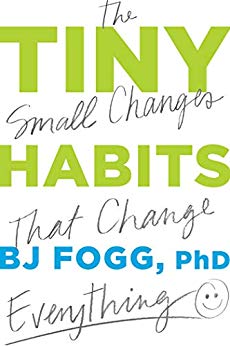More on this book
Community
Kindle Notes & Highlights
by
B.J. Fogg
Read between
September 19 - October 10, 2023
An Action Prompt is a behavior you already do that can remind you to do a new habit you want to cultivate.
Your Anchor must be something that happens reliably in your life.
So morning is likely our most predictable time, but there is plenty to work with in the afternoon and evening.
To find the Trailing Edge, we look at the Anchor under a microscope to see what the end of an action looks like.
Instead of starting with a habit you want to create and finding a place for it, you begin with the routines you already have and find new habits to plug in.
Starting with your reliable daily routines—your Anchors—you can find what new tiny behavior to insert after them.
a well-designed prompt is vital for most businesses.
As you try to increase adherence, explain that many successful patients do this daily habit at one of three times. Ask them, “Which one of these times would work best for you?”
By using his negative behavior to prompt positive behavior on her part, she became happier and more capable of compassion.
As human beings, we have instincts that tell us how someone feels about us even if they’re not being explicit.
EXERCISE #1: FIND YOUR ANCHORS
List all the daily habits
After I ———, I will ———.
List at least ten things that often happen to you that irritate you
When you celebrate effectively, you tap into the reward circuitry of your brain.
A range of positive experiences can reinforce a new behavior that leads to a habitual response.
There is a direct connection between what you feel when you do a behavior and the likelihood that you will repeat the behavior in the future.
Decisions require deliberation, habits do not.
As humans, we are deeply wired for emotions, which is why most of us are a mixed bag of habits—some we want and plenty we don’t.
Celebration is the best way to create a positive feeling that wires in your new habits.
The neurochemical reaction that you are trying to hack is not only time dependent, it’s also highly individualized.
When you find a celebration that works for you, and you do it immediately after a new behavior, your brain repatterns to make that behavior more automatic in the future.
Help people do what they already want to do.
Success comes from helping ourselves do what we already want to do.
Celebration might not feel natural to you, and that’s okay, but practicing this skill will help you to get comfortable.
find the deeper meaning in what you are doing.
You’ve got to lower your expectations.
celebrating at three different times: the moment you remember to do the habit, when you’re doing the habit, and immediately after completing the habit.
After a habit becomes automatic, you no longer need to celebrate.
We have the opportunity to take actions every day that accumulate and drive our self-conception.
The feeling of success is a powerful catalyst for change.
Like plants, each of your habits will scale differently and at its own pace.
the formation time of a habit depends on three things: The person doing the habit The habit itself (the action) The context
One key to designing long-term change is to reduce or remove the demotivators.
Start where you want to on your path to change. Allow yourself to feel successful. Then trust the process.
Clarify your aspirations or desired outcomes Understand what motivates you—i.e.,
What is the tiniest habit I could create that would have the most meaning?
Don’t pressure yourself to do more than the tiniest version of your habit.
Our environment, which includes people, influences our habitual behaviors more than we recognize or care to admit.
How can I make this new habit easier to do?
When you design new habits, invest time in redesigning your environment so they’re easier to do.
make the environmental adjustments as you go along, redesigning as needed
Question tra...
This highlight has been truncated due to consecutive passage length restrictions.
Invest in the gear you need.
Weight loss happens mostly through changing how we eat.
When I open our fridge, I see a bunch of glass containers filled with food ready to eat.
All humans have a strongly rooted drive to act in a way that is consistent with their identity.
driving all this change was his ability to embrace a new identity.


